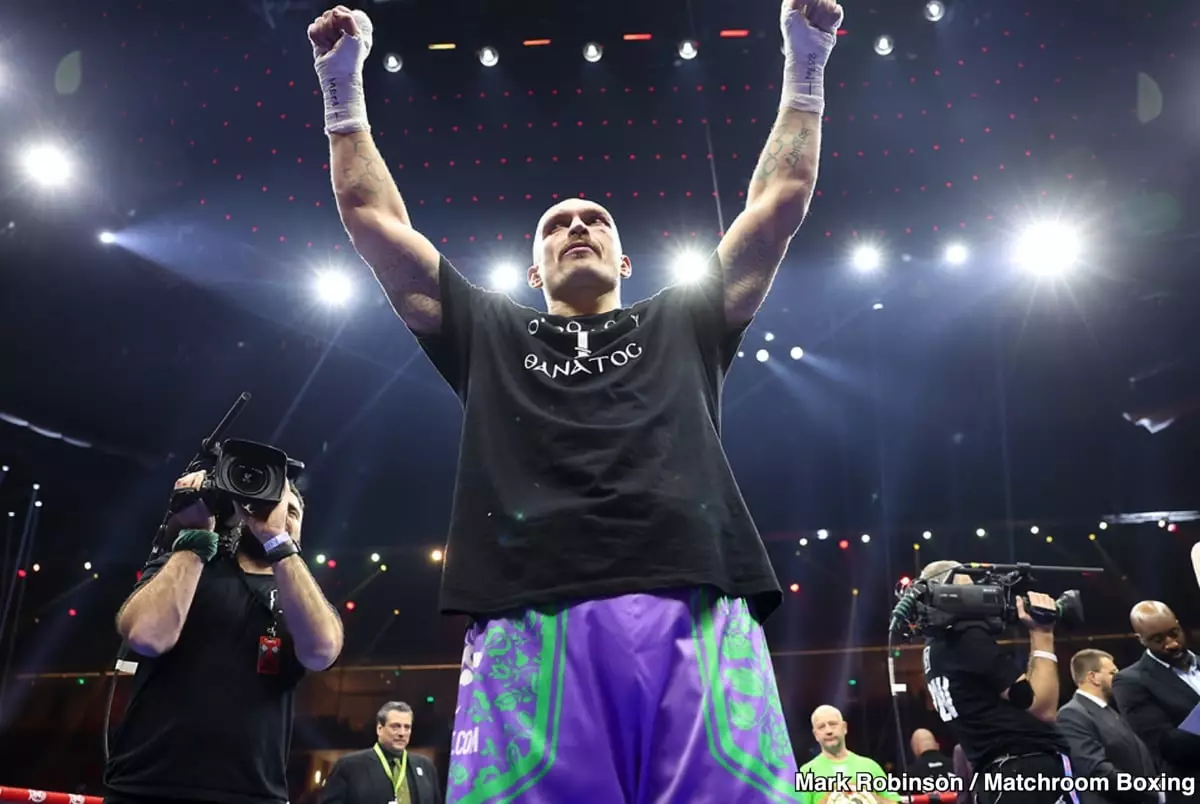The boxing world has long been enamored with the exceptional talents of Ukrainian heavyweight champion Oleksandr Usyk. His ascent from the cruiserweight division to heavyweight supremacy has drawn numerous accolades, often branding him an all-time great. Prominent figures in the boxing community—such as Adam Smith, Spencer Oliver, and Carl Froch—have lent their voices in praise, advocating that Usyk’s skills and accomplishments warrant a place among the sport’s most storied legends. However, the conversation becomes contentious with dissenting opinions, notably from former champion turned commentator Tim Bradley, who has taken a critical stance regarding Usyk’s legacy.
Tim Bradley, a respected voice in boxing analysis, challenges the prevailing narrative that Usyk’s accomplishments position him among the all-time greats. In his public remarks, Bradley questioned the merit of dubbing Usyk as an unparalleled icon of the sport merely due to his victories over Anthony Joshua and Tyson Fury. Bradley’s argument hinges on the notion that having participated in only seven heavyweight fights does not substantiate a claim to greatness. This perspective, while understandable, feels somewhat reductive considering the weight of Usyk’s achievements.
Bradley acknowledges Usyk’s remarkable success at cruiserweight, where he unified all major titles, yet remains unconvinced of his standing among the elite heavyweights. A closer examination reveals that questioning Usyk’s all-time great status solely based on fight count overlooks the substance and significance of his victories. Defeating seasoned champions such as Joshua and Fury, especially after transitioning from a lower weight class, is no small feat. Usyk’s record reflects not only competency but also a profound mastery over the styles of fighters far beyond his initial weight category.
Usyk’s accolades are substantial, showcasing a breadth of skill that few fighters have rivaled. His tenure as an amateur was marked by nearly unmatched success, featuring a staggering 335-15 record, adorned with European, World Championship, and Olympic gold medals. Transitioning to professional boxing, he conquered the cruiserweight division with a professionalism and dominance that spoke volumes about his boxing intellect and tenacity. His recent achievements include an impressive run in the heavyweight division, where he unified titles against formidable opponents.
Critics, however, argue that achieving the status of an all-time great requires more than just accolades; it demands consistency, longevity, and a legacy that endures the test of time. They question the depth of Usyk’s knockout-to-fight ratio and the sheer number of opponents he has faced as a heavyweight. It raises the question: What constitutes proof of greatness in contemporary boxing?
The heavyweight division is traditionally where the stakes are highest, presenting not only physical challenges but also the legacy of historical iconic fighters. Opponents such as Mike Tyson, Muhammad Ali, and Joe Louis have cemented their places in the history books through remarkable performances that defined epochs in boxing. Usyk’s path diverges significantly from theirs, which could contribute to skeptics’ reticence in accepting him as an all-time great.
Bradley’s assertion that Usyk has not “cleaned out” the heavyweight division adds another layer to this debate. However, this view prompts further scrutiny regarding the meaning of “cleaning out” a division—a subjective measure that varies widely among boxing analysts. Usyk’s victories over heavyweight behemoths show a willingness to engage with the best in the sport, yet his critics insist on the necessity of additional title defenses and challenges against rising contenders.
As Usyk contemplates the next chapter of his career—whether to remain at heavyweight or drop back to cruiserweight—the question of his legacy looms large. He stands at an intriguing juncture where further victories could either solidify or complicate his status among boxing’s immortals. A rematch with Daniel Dubois or a showdown with another leading heavyweight could provide the opportunities for Usyk to reshape the narratives surrounding his legacy.
The boxing landscape appears increasingly unpredictable, and Usyk is a pivotal figure in it. With his current record of 22-0 and impressive victories across multiple weight classes, the fighter must contend with the opinions that characterize his place in history. This duality of profound respect and critical skepticism embodies a broader enigma in sports: how to quantify greatness amidst ever-evolving definitions.
Oleksandr Usyk’s trajectory continues its ascent, yet it is met with opposition that begs for deeper critique and analysis. Strip away the sentiments, and one must grapple with the essential truths of what makes a fighter an all-time great. Usyk’s legacy unfolds as a fascinating puzzle, pitting historical standards against modern achievements in a sport that swiftly changes its thresholds for greatness.

